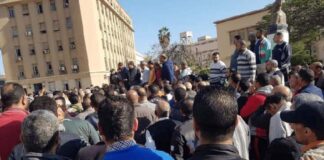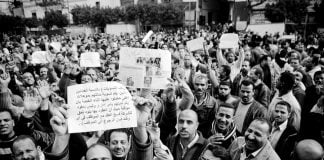People power revolutions are shaking the Middle East. Together with the revolution in Tunisia, Egypt’s revolt has shown the power of ordinary people to bring down even the most repressive and authoritarian regimes.
Three weeks of massive demonstrations have succeeded in toppling Egyptian dictator Hosni Mubarak. Euphoria swept the country as Egyptians in their millions chanted in the streets, “We have brought down the regime” and “Egypt is free”. Mubarak’s dictatorship survived for more than three decades based on a ruthless security force up to two million strong.
But overcoming their fear, ordinary Egyptians flooded the streets of Cairo, Suez, Alexandria and many other cities, with the capital’s Tahrir square the protests’ symbolic centre. Day after day they faced down attempts by Mubarak’s thugs to create chaos, spread fear and physically drive the revolutionaries from Tahrir square. At least 365 people were killed by the regime as it tried desperately to cling onto power.
The revolution is an historic event that will reshape the Middle East, and challenge US power. Following the uprising that toppled the Ben Ali dictatorship in Tunisia, corrupt regimes across the whole region are asking whether they will be next to fall.
As the Russian revolutionary Leon Trotsky put it, a revolution means, “the forcible entrance of the masses into the realm of rulership over their own destiny.” It begins at the point where ordinary people will no longer accept being ruled in the old way. Old habits of fear and subordination melt away as people begin to feel their power to reshape society.
But the revolutions in Egypt and Tunisia are more than just movements for democracy. Forty per cent of Egyptians live on less than $2 a day. The uprisings were driven by the global economic crisis, which has further pushed up unemployment and desperation. The demands of the revolutionaries have been about poverty as well as against Mubarak.
In the days before Mubarak fell workers began to stage widespread strikes demanding pay rises and a national minimum wage (see p15).
Even with Mubarak gone the revolutionary process is not at an end. The army has stepped in to form a provisional government. But the army is part of a regime which most Egyptians want to get rid of. The generals will want to maintain their wealth, and keep in place as much of Mubarak’s political order as possible.
Army takeover
The army has been the ruling institution in Egypt since 1952, with a succession of military governments. Mubarak himself was the commander of the air force. The top levels of the army are built into the networks of wealth and privilege that Mubarak created. Some of Egypt’s largest businesses are run by the army—including agricultural, industrial and commercial operations. Three days after Mubarak’s fall they appealed for an end to strikes, in what was seen as a warning before an outright ban.
The US and the army are looking for an “orderly transition” and “stability”. What this means is finding a leader happy to maintain neo-liberal economic polices and continue Egypt’s peace treaty with Israel and support for US foreign policy.
But this will be difficult in a country where 78 per cent oppose the US “war on terror”, the highest of any country, according to a poll by the Pew Research Centre last year, and 92 per cent viewed Israel as an “enemy state” in a 2006 poll.
As Ahmed Makram, a 36 year-old lawyer told the Egyptian Al-Masry Al-Youm newspaper, “The main slogan is, ‘Down with the system.’ Until now, only one section of the system has fallen”. The movement will need to continue if it is to make sure the regime is dismantled, and rampant economic inequalities are dealt with. The key to this is Egyptian workers stepping up their strike movement.
Workers were at the forefront of many of the protests on the streets, particularly in cities like Suez. They will have gained confidence from this about the power of protests and strike action. Egyptian workers will need to be at the heart of driving the revolution forward if it is to fulfil its potential and become “permanent” through the fight for a socialist revolution in Egypt (see p18).
Sustaining such a revolution will require active solidarity from across the world. Australian Foreign Minister Kevin Rudd visited Egypt to meet then President Mubarak in December and said nothing about rigged elections a few weeks earlier. The Australian government is tied into supporting US aims in the region, shown by its sending troops to fight in Afghanistan. We have to demand that they support the right of the Egyptian people to determine their own future without US interference.
We can also learn from the power and courage shown by the Egyptian people on the streets of Cairo in resisting cutbacks and racism pushed by our own government. Their struggle is an inspiration to those fighting everywhere against hardship and oppression. It shows the possibilities of winning a new world based on justice and human need.





